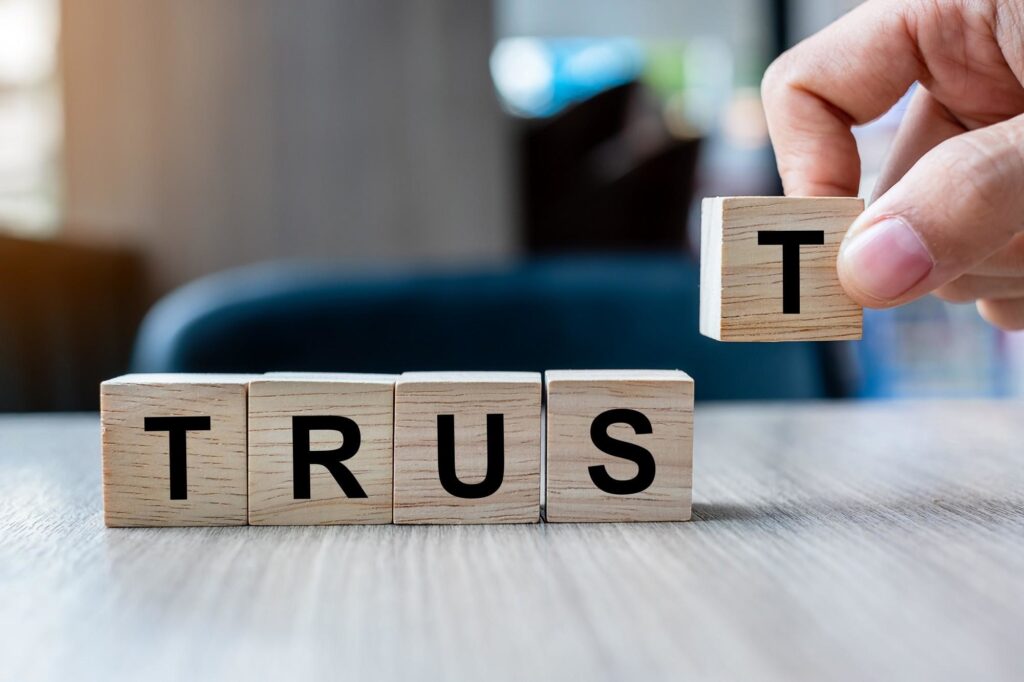Does your B2B or B2C website include plenty of trust signals? If not, you could be missing a trick and losing customers.
What is a Trust Signal?
Trust signals are evidence points that appear online to help customers feel more secure in their decision to purchase from a business or buy a product or service. – wikipedia
Why and How Social Proof Influences Consumers
Looking for trust signals is something we all do, either consciously or subconsciously. Before engaging with an online business we are unfamiliar with, we look for reassurance that the business is trustworthy.
Trust is incredibly important when it comes to increasing conversions. Considering the rapport you have with your website visitors is something that is often overlooked, but it is vital to build trust and let customers know that you will deliver on your website’s promise.
Does your website include the most important Trust Signals?
Most successful online businesses invest a lot of time nurturing trust signals. So, if you’re wondering if your website includes everything it needs to inspire confidence in your prospects, here’s a list of the obvious (and some not so obvious) must-have trust-signals:
1. Company number
All limited companies in the UK will have a unique company number from HMRC. This number should be displayed on your website. Most websites include this information in the footer. Include your VAT number, if you have one. These numbers can be used to do a background check on your business and prove authenticity.
2. Registered address and phone number
If you have them, providing your company’s registered address and phone number (preferably a landline) gives an excellent trust signal, providing more authority than just a mobile phone number.
3. Reviews, testimonials and case studies
Reviews, testimonials and case studies are right up there among the most important trust signals. Customers really do want to know how others have rated the product or service they are thinking about investing in. Positive company reviews are particularly important for B2B. They’re a great way to showcase your satisfied customers. Display them proudly, the more the better.
4. Good grammar
Good grammar is more important than you might think. If potential leads happen upon sloppily written content, they may equate that with sloppy service – and look elsewhere! Do spend time reading and re-reading your site content. Look for spelling slips or nonsensical grammar. Not getting your content up to scratch could really impact your business.
If you’re unsure about your content, you could run it through grammarly. For a more comprehensive solution, our in-house Copywriting Service can help with either content creation, or copy editing.
5. Great design
A professional looking website will significantly boost customer trust. Your website should include most, if not all of the following:
- A simple, easy to navigate layout
- Easy to read, compelling headlines
- Concise, well-written content
- Fast loading pages
- Good user experience across all devices
- Top-level domain (TLD) .com or .co.uk domains garner the most trust
- Custom photography. Stock imagery has its place, but your own photographs will help visitors get to know you or your product better.
Learn more about great website design in our recent blog ‘6 Essential Elements of Successful Website Design’.
6. Trust signals within website pages
As visitors navigate their way through your site, you have a lot of opportunity to build trust signals through the different pages:
- About Page – A great way to give a little background around your business; its origins, your staff, your mission. All of this information serves to present your business as unique and authentic
- Meet the Team – You can build a lot of rapport here. It’s really important, particularly for B2B marketing, to put faces and personalities to names. People want to have a feel for who they will be dealing with.
7. Licences, Certificates & Accreditations
Industry certification, accreditation and awards are excellent trust markers that confirm your authority and should always be displayed on your website. These are particularly useful signals for B2B prospects, who will be familiar with and searching for relevant accreditations.
8. Up to date content
Up to date content is a feature of most trusted online businesses. Prove that you’re active and successful with lots of fresh content including:
- Regular blog posts, articles or case studies
- Video uploads
- Updated info for forthcoming events
And of course, don’t forget to remove outdated content. It just looks sad! Copyright notices need updating every year, so put in place a copyright notice that updates the year automatically.
9. SSL certification
Make sure your brand’s url starts with “https”. That little padlock sign in the address bar is something that many computer savvy customers have come to expect. They know that with an SSL certificate, the communication between your browser and server is protected from cyber-attacks. There is nothing more off putting than a site flagged by Chrome, Safari or Firebox as non-secure.
10. Crystal clear payment systems
For an ecommerce website, it’s essential that your payment system is clear. Be sure to include accepted payment types (MasterCard, Visa, etc).
11. Shipping and returns policy
With more and more purchases being made online (particularly post-Covid lockdown), be very clear about your shipping and returns policy. Promising prompt delivery is an excellent trust signal. Just as importantly, making returns easy for the customer will increase faith in your brand. Be reasonable, specific and lenient to increase confidence in your service.
12. Social Media
A strong off-page presence can be built up using Social Media. Interested customers looking for reasons to trust your brand will carry out their own research through Instagram, Facebook, Twitter etc. Successful online businesses will:
- Have a strong Social Media presence and post regularly
- Respond to questions and reviews on SM in a timely fashion
- Set up ‘My Business’ on Google
You could even start posting videos on YouTube, or TikTok!
But don’t set up Social Media accounts and leave them to wither (we can all be guilty of this!). If your last post was from 2017 it won’t look great.
13. Privacy Policy
Yes, a little boring. Who ever reads them? Not many people to be fair but they are important (and affect SEO). Privacy policies are a legal requirement for most websites, and not having one is a red flag for search engines.
14. Have you participated in an industry event?
Speaking or exhibiting at industry events can lead to mentions on the event’s website or within their press-release. This brings kudos and is a top trust signal for your brand.
15. Charity work and community involvement
Don’t be shy! If you or your employees get involved in charity work, then shout it from the rooftops in a blog post or article. Goodwill is a superb trust signal.
16. Backlinks
It’s not just your customers that need to trust you – Google loves a high quality backlink from an authoritative source. If the backlinks come from a diverse range of sites, all the better.
17. Click-throughs
Google is very interested in how many click-throughs come via the SERPs (search engine results pages). A good click-through rate indicates authority and trust.
and finally…
18. Website visitor engagement
The longer visitors stay on your site the better, as far as Google is concerned. Engagement metrics give Google a lot of clues about your site quality. So give your visitors the best UX. The better the user experience, the longer they’ll stay on the site.
Conclusion
Hopefully we’ve gone some way to explaining how trust signals provide good social proof and impact the behaviour of prospective customers. Building up a solid bank of trust signals will help your brand turn interested prospects into paying customers.
If you would like some help implementing any of the tips above, do feel free to pick up the phone and call us on (01423) 609005 or drop us a line. We’d love to help!

